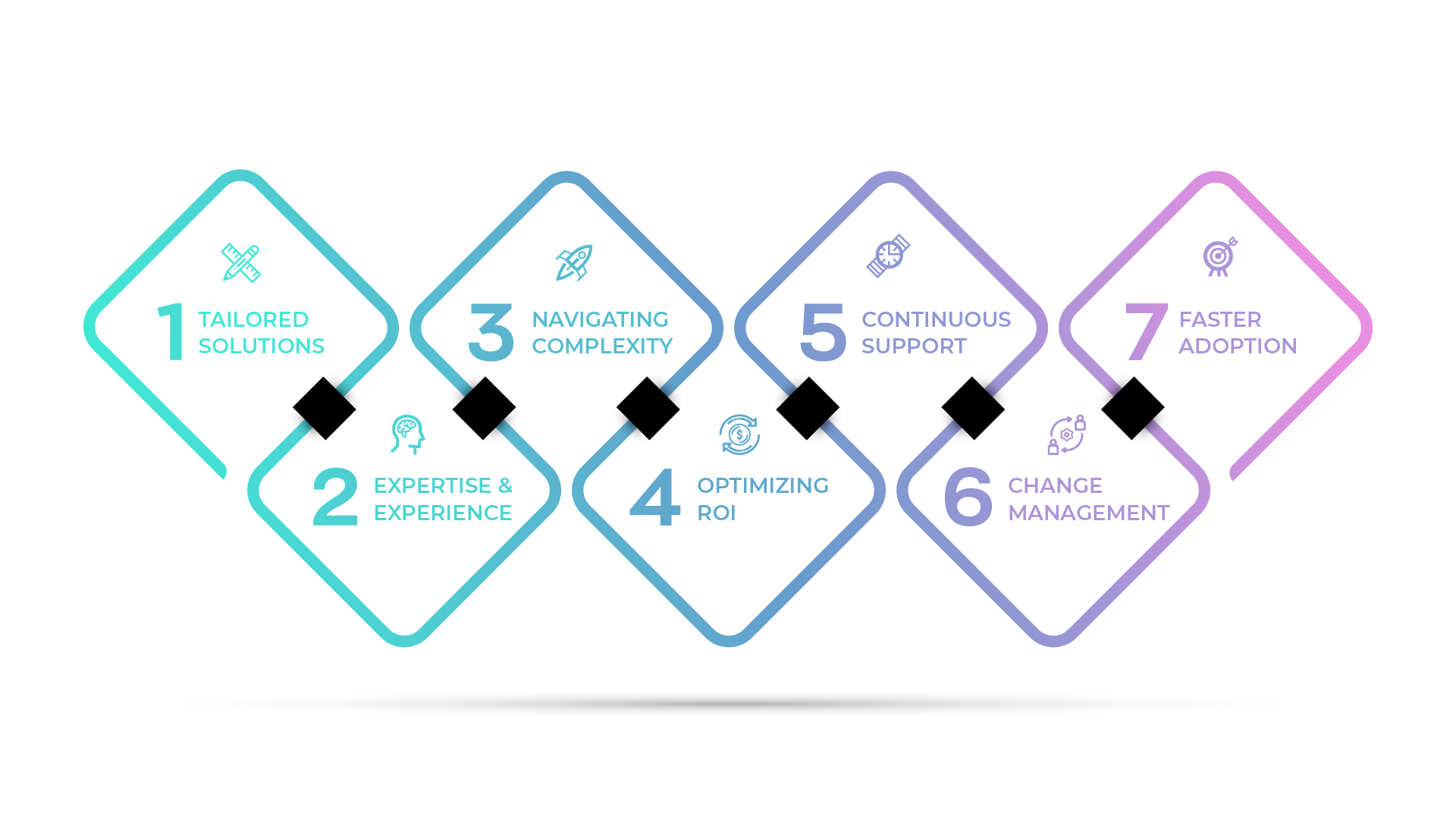What is an ERP Consultant? ERP Consulting Services, Types Explained
Have you ever wondered how businesses manage their complex processes and data seamlessly? Well, that’s where an ERP consultant comes to the rescue! An ERP consultant is like a tech-savvy problem solver who helps companies make the most of their ERP systems. ERP, short for Enterprise Resource Planning, is a powerful software integrating various business functions into one centralized system.
In this blog, we’ll dive into the world of ERP consulting services and explore the different types of consultants who work their magic behind the scenes. So, let’s get started and unravel the secrets of this fascinating world!
What is ERP?
ERP software, which stands for Enterprise Resource Planning, is a comprehensive and integrated software solution designed to streamline and optimize business processes across an entire organization. It is the backbone of modern businesses, offering a centralized platform to manage various functions like finance, human resources, procurement, manufacturing, sales, and more.
If you have asked, “What is ERP Software?” picture ERP as the central nervous system of your company, connecting different departments and ensuring smooth communication and data sharing. Instead of having separate systems for each department, ERP brings them all together, fostering collaboration, data consistency, and efficiency.
With ERP, you can bid farewell to the days of manual spreadsheets and repetitive tasks. It automates processes, tracks transactions, and generates real-time reports, empowering decision-makers with valuable insights.
ERP is like having a Swiss Army knife for your business—it simplifies operations, enhances productivity, reduces costs, and boosts overall performance. Whether you’re a growing startup or an established enterprise, ERP is the ultimate tool to achieve business success and stay ahead in today’s competitive world.
What does an ERP Consultant do?
An ERP consultant is the guiding light that helps businesses navigate the complex world of Enterprise Resource Planning. Their role is akin to a skilled navigator, assisting organizations to chart the best course to make the most of their ERP systems.
What is the Role of an ERP Consultant?
First and foremost, an ERP consultant is a great listener. They take the time to understand a business’s unique needs and challenges, learning about its processes, goals, and aspirations. Armed with this knowledge, they collaborate with the company’s stakeholders to design a tailored ERP strategy.
Like a seasoned detective, an ERP consultant delves into the nitty-gritty of the organization’s operations. They analyze existing systems, identify inefficiencies, and pinpoint areas for improvement. Then, equipped with their technical expertise, they recommend the most suitable ERP software and modules that align with the company’s requirements.
Implementation is where the ERP consultant truly shines. They oversee the installation, configuration, and customization of the ERP system, ensuring it fits seamlessly into the business landscape. They work closely with employees, providing training and support to ensure a smooth transition.
But the journey doesn’t end there. Like a steadfast mentor, the ERP consultant guides the business post-implementation. They troubleshoot issues, fine-tune the system, and monitor its performance to adjust when needed.
An ERP consultant is not just a technical expert; they are a strategic partner, helping businesses optimize their processes, make informed decisions, and achieve their objectives. They are the driving force behind a successful ERP journey, and their expertise is instrumental in transforming businesses into efficient and flourishing entities.
Why do You Need an ERP Consultant?


Partnering with an ERP consultant is like having a seasoned expert guide you through the intricate ERP landscape. Here’s why you need their invaluable support:
- Tailored Solutions: Every business is unique, and an ERP consultant understands this well. They work closely with you to understand your needs and design a customized ERP solution that aligns perfectly with your goals and processes. This personalized approach ensures you get the maximum benefits from your ERP investment.
- Expertise and Experience: ERP consultants bring a wealth of knowledge and experience. They have worked with various industries and businesses, witnessing multiple challenges and solutions. This expertise allows them to offer valuable insights, best practices, and innovative ideas to enhance your business processes.
- Navigating Complexity: Implementing an ERP system can be complex and daunting. An ERP consultant acts as your trusty navigator, guiding you through each stage of the process. They help you avoid pitfalls, address potential roadblocks, and keep everything on track, ensuring a smooth and successful implementation.
- Optimizing ROI: ERP is a significant investment, and you want to ensure it pays off. An ERP consultant maximizes your Return on Investment by identifying areas for cost savings, process efficiencies, and performance improvements. They help you get the most out of your ERP system and ensure long-term benefits.
- Continuous Support: ERP implementation is not a one-time event; it’s an ongoing journey. An ERP consultant provides continuous support post-implementation, monitoring the system’s performance, addressing issues, and making necessary adjustments. Their availability ensures that your ERP solution remains effective and up to date.
- Change Management: Introducing an ERP system often involves changes in workflows and job roles. An ERP consultant assists in change management, helping employees adapt to the new system smoothly. They provide training, address concerns, and foster a positive attitude toward embracing technology-driven transformations.
- Faster Adoption: With an ERP consultant by your side, the learning curve becomes less steep. They empower your team with the knowledge and skills to quickly make the most of the ERP system. This accelerates the adoption process, minimizing disruptions to your operations.
Signs Of a Good ERP Consultant
Identifying a good ERP consultant can be crucial to the success of your ERP implementation. Here are some telltale signs to look for:
- Deep ERP Knowledge: A competent ERP consultant has extensive knowledge of various ERP systems, functionalities, and industry-specific requirements. They stay updated with the latest trends and developments in the ERP landscape.
- Understanding of Business Processes: An effective ERP consultant takes the time to understand your business processes, pain points, and objectives. They analyze your workflows to tailor the ERP solution to your specific needs.
- Experience and Track Record: Look for a consultant with a proven track record of successful ERP implementations. Their experience in handling similar projects will give you confidence in their ability to navigate challenges and deliver results.
- Good Communication Skills: Communication is vital to a successful ERP project. A skilled consultant communicates clearly and effectively with stakeholders at all levels, ensuring everyone is on the same page throughout the implementation.
- Problem-Solving Abilities: ERP projects can encounter unexpected issues. A reliable consultant demonstrates solid problem-solving skills, calmly tackling challenges and finding creative solutions to keep the project moving forward.
- Client Testimonials and References: Check client testimonials and seek references from previous clients. Positive feedback from satisfied customers is a good indicator of a consultant’s competence and professionalism.
- Training and Support: A good ERP consultant needs to implement the system and leave. They provide comprehensive training to your team and offer ongoing support to address any post-implementation issues.
- Strong Project Management Skills: ERP implementations involve multiple tasks and stakeholders. A proficient consultant excels in project management, organizing the process efficiently and ensuring timely delivery.
- Honesty and Transparency: Look for a consultant who is honest about the challenges and limitations of the ERP system. They should communicate transparently, setting realistic expectations from the outset.
- Adaptability: Every business is unique, and a good consultant adapts their approach to suit your company’s culture and requirements. They should be flexible in their methods and open to feedback and suggestions.
The Stages of ERP Consultation
The ERP consultation process typically follows several stages, each essential for a successful implementation. Let’s walk through them:
- Discovery and Analysis: The first stage involves the ERP consultant getting to know your business. They comprehensively analyze your current processes, workflows, pain points, and future goals. This phase sets the foundation for tailoring the ERP solution to your needs.
- Requirements Gathering: Based on the analysis, the consultant works closely with key stakeholders to gather detailed requirements for the ERP system. These requirements define the project’s scope and guide the selection of appropriate ERP modules and functionalities.
- ERP Selection: With the requirements in hand, the consultant assists you in choosing the right ERP software that best aligns with your business needs and budget. They may also help you evaluate different vendors and their offerings.
- Design and Customization: This stage involves designing and customizing the ERP system architecture to suit your business processes. The consultant ensures the ERP solution is optimized to streamline your operations efficiently.
- Implementation Planning: A solid implementation plan is crucial to avoid disruptions to your business. The consultant and your team create a detailed roadmap, setting timelines and milestones and allocating resources accordingly.
- Data Migration: If you’re transitioning from existing systems, data migration is a critical phase. The consultant ensures a smooth data transfer from legacy systems to the new ERP solution, maintaining data integrity.
- Configuration and Setup: In this stage, the ERP consultant configures the software based on your requirements. They set up user roles, permissions, workflows, and other essential elements to ensure seamless functioning.
- Testing and Quality Assurance: The ERP system undergoes rigorous testing before going live. The consultant conducts various tests to identify and resolve issues, ensuring the system performs flawlessly.
- Training and User Adoption: The consultant provides comprehensive training to your team, enabling them to use the new ERP system effectively. They also assist in change management to ensure smooth user adoption.
- Go-Live and Support: When the ERP system is ready, it’s time to go live. The consultant monitors the system during this critical phase and provides immediate support to address unforeseen challenges.
- Post-Implementation Review: The consultant conducts a post-implementation review after the ERP system has been operational. They gather user feedback, assess the system’s performance, and make necessary improvements.
- Continuous Support and Maintenance: ERP consultation is not a one-time event. The consultant offers ongoing support and maintenance to keep the system running smoothly and to help you adapt to changing business needs.
By following these stages, an ERP consultant ensures a well-structured and efficient implementation process, setting the stage for your business’s transformation and growth with the new ERP system.
Ready to take your business to new heights with the power of ERP? Take advantage of the opportunity to optimize your processes, boost productivity, and drive success. Reach out to our expert ERP consultants today and embark on a transformative journey toward a more efficient and thriving future for your business. Let’s make your ERP dreams a reality together!
Come say "Hi"
Partner with ERP Buddies, aN ERP Solution Provider
ERP Buddies is a Global ERP Solution Provider with diverse experience in implementing and Supporting NetSuite ERP for many industries.
With operations in the North America, Europe, Asia and United Kingdom, our Expert Team is accessible globally. It is their priority to create a smooth and positive experience for clients. Our experts assist clients throughout the entire implementation process, with on-site support and consultation and additional assistance in customizing your system to guarantee it meets your business needs. For our contact info, click below, and personnel for review will be in touch.
We can’t wait to get in touch with you!












